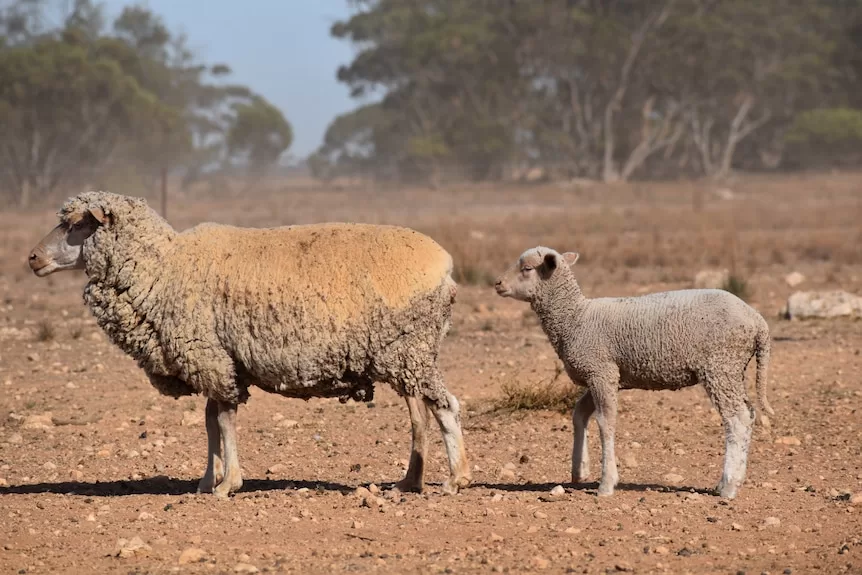- In short: Farmer confidence has nose-dived in SA as many parts of the state experience their driest starts to the year.
- The state’s farmers are the least confident in the nation and almost half expect the situation to worsen in the coming year.
- What’s next? The state’s ag department hopes grain production will reach the 10-year average.
A continued lack of rain has pushed farmer confidence in South Australia to the lowest in the nation, in what is being described by an analyst as a “dramatic U-turn”.
The state has recorded one of its driest starts to a year, which has caused confidence to plummet in the past three months, according to Rabobank’s latest farmer survey.
Rabobank deputy regional manager for SA, Adam Moss, said the lack of rain was the most significant factor pushing farmers to feel negative about the year ahead.
“There’s been a massive turn around in confidence, decreasing from plus 19 per cent for quarter one, to minus 38 per cent for quarter two,” Mr Moss said.
“[That’s] very much understandable given the lack of rainfall during autumn.”
The survey showed almost half of SA farmers expected the situation to worsen, particularly in the sheep sector.
Confidence fall widespread
Mr Moss said the pessimism spread across almost all areas of the state and farming sectors.
“Every farmer is reliant on the rain and there’s been small pockets where there’s been maybe some reasonable rainfall, but certainly not general,” he said.
“There’s not a lot of feed available at the moment and there’s other matters about fertiliser, diesel, chemical costs.
“So [there is] a lot of uncertainty with an expectation that may worsen the economy for farmers over the next 12 months.”
Sheep producer in SA’s mid north, George Millington, said he was experiencing dry and tough conditions.
“It’s been an extraordinarily dry period,” he said.
“I completely understand when you’re farming, and particularly when you’re grazing, you live from day-to-day and it’s not like some other businesses which operate in cities where you get to then go home on the weekend … and then come back and be a little bit more reflective.
“There is no doubt when you live agriculture, you live on the place, you work on the place … so what you see happening around … becomes all consuming.”
Help with hay
Need for Feed founder Graham Cockerell said his charity volunteers were busy driving donated hay around Australia, particularly to western Victoria, Western Australia and Tasmania’s King Island.
He said while donations of hay were coming from South Australia at the start of the year, there was now a need to run hay back into the state.
“We have been doing some [hay runs] up around World’s End and further across, north-east of the Yorke Peninsula … but that dry area has crept further south and further east,” he said.
“We’ve announced a hay run to south-west Victoria, which will probably more than likely jump across the border into South Australia at the same time, if we’ve got enough.”
With supply tight, Mr Cockerell said he hoped for more donations as demand was likely to continue for months to come.
“Even if all those places get rain now, they’re still going to be looking to part-way into spring before they get any decent growth,” he said.
Hope remains for rain
The majority of South Australia’s winter crops have been dry-sown by farmers, with little rain to begin germination.
However, the state department of primary industries has predicted the 2024/25 grain season will still produce close to the 10-year average of 8.5 million tonnes, if forecast late winter rain arrives.
Mr Moss said he expected farmer confidence to rebound swiftly when that happened.
“We know our farmers are resilient and really all they need is that sign that we’ve got some decent rain, and I think that it will bounce back fairly quickly,” he said.
Back at Mr Millington’s property, he said despite the challenges, farmers had reasons to be confident.
“There is no doubt the longer-term outlook for agriculture is very strong,” he said.
Mr Millington encouraged farmers to reach out to others if they were finding the dry times hard.
“I’d ask everyone out there to try and talk to a neighbour and make sure that they think their handling the dry period just as well as they are,” he said.
Stories from farms and country towns across Australia, delivered each Friday.
